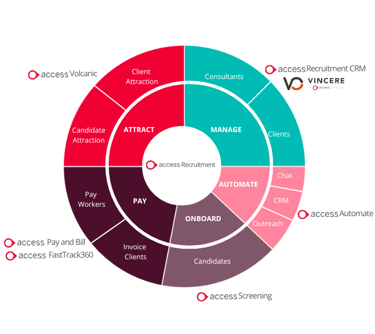Permanent recruitment agency software built for top-billers
Whether you’re recruiting at scale or placing C-suite talent, top-billers need more than just a database, they need an engine. Our permanent recruitment agency software is built for recruiters who want to source smarter, scale faster, and automate everything (except relationships).

Turn every relationship into a revenue opportunity with our permanent recruitment software
From CRM/ATS and automation to recruitment websites, our all-in-one permanent recruitment platform is purpose-built to help perm agencies fill roles faster, win repeat business, and turn top candidates into lasting placements.
Meet the growth engine behind high-performing perm recruitment agency
If your CRM feels like a digital filing cabinet and your recruiters waste hours on manual tasks, it's time for an upgrade. RecOS unifies recruitment CRM, automation, websites, onboarding, and billing in one powerful platform built for speed, scale, and standout candidate experiences.
One powerful platform to run your perm agency
Right now, you might only need CRM, automation, and a killer website, but when the time comes to launch a temp or contract desk, you won’t need to rip and replace your tech. Our recruitment operating system includes onboarding, payroll and billing, and compliance tools, so when you're ready to expand, we’ve already got you covered.

Power up your perm recruitment with the latest time-saving software
Permanent recruitment software FAQs
What makes your software different from a standard CRM?
Most CRMs just store data. Ours drives placements. With built-in automation, AI-matching, LiveLists™, and seamless client-candidate collaboration, our RecOS is built to help recruiters move faster, place smarter, and grow without the admin drag.
Can this work for both boutique and enterprise perm agencies?
Absolutely. Whether you're a fast-growing team or a 100+ user powerhouse, we’ve got you covered. Vincere gives scaling agencies speed and simplicity, while Access Recruitment CRM is built for enterprise complexity and custom workflows.
How does your platform help reduce time-to-hire?
From AI-powered shortlisting to self-serve interview scheduling, our software eliminates bottlenecks at every stage. It automates repetitive tasks, keeps your pipeline warm, and gets candidates hired before your competitors even catch up.
Will it integrate with the tools we already use?
Yes. Our RecOS plugs right into your tech stack, including job boards, LinkedIn, payroll systems, marketing tools, and more. Everything syncs in real time - no manual data wrangling, no missed updates.
Our RecOS platform
From software products designed to solve key challenges to a fully integrated solution:
- Providing your recruiters with tools to drive revenue
- Supplying your management with necessary reporting
- Reducing operating costs by building efficient and scalable middle and back-office teams
- Enhancing the digital experience for applicants, workers, and clients
Discover how Access can help your entire recruitment business become more productive and efficient, giving you the freedom to focus on clients and candidates.








